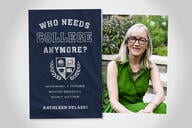You have /5 articles left.
Sign up for a free account or log in.
While studies of assessment appear with regularity, they rarely feature the word "sublime." But today the Teagle Foundation will release Literary Study, Measurement, and the Sublime: Disciplinary Assessment. The book is a collection of essays from leading figures in literary studies and experts on assessment considering how the current desire to measure can help or hurt the study of literature. The editors of the volume, Donna Heiland, vice president at Teagle, and Laura J. Rosenthal, professor of English at the University of Maryland at College Park, responded to questions about the new book.
Q: How can the words "assessment" and "sublime" coexist in a book title?
A: Good question! Humanists are sometimes wary of assessment because they feel that there is something ineffable at the heart of their work in the classroom. We realized that the ineffable itself -- in the form of theories of the sublime -- is a subject that we think about a lot. And we wondered whether we could invite people to talk about ineffability -- about the sublime -- as a way of coming to understand some of our most cherished learning goals for our students, and even assessing them. In a way, we were inviting people to face head-on the thing that no one thinks we can talk about. And the collection developed from there.
Q: What is the role of "disciplinary" assessment -- as opposed to overall assessment of student learning?
A: Many instruments have been developed to assess students’ achievement of overall learning goals, but less thought has been given to students’ learning in their majors. Disciplinary assessment has the potential to help us understand student learning in a more nuanced way. And -- as we hope this volume demonstrates -- the disciplines also have distinct ways of thinking about student learning that can enrich assessment practices.
Q: Many in the humanities fear, in the words of one essay title, "the slippery slope from assessment to standardization." Do these essays lead you to believe that there is a path forward that avoids that slope?
A: The essays engage this question from a variety of perspectives. One essay embraces standardization, making the case that we have more shared goals than we realize. Another expresses considerable concern that pressures for standardized assessment will seriously erode the possibility of colleges and universities achieving their goals for their students. Many of the essays point implicitly to a way forward through shared if not entirely standardized assessment practices that focus on such things as alignment of courses within a department. So speaking just for ourselves, we’d say yes, there is a way forward that avoids that slope.
Q: Many in the humanities say that they are committed to assessment, just not to nationally normed assessment. Is that a reasonable position?
A: If nationally normed assessments are seen as pushing us to reductive measurements of student learning, or to homogenization of the rich and varied landscape of American higher education, then this is a reasonable position. But nationally normed assessments have also served us well: they have demonstrated, among other things, how crucial study in the humanities is to the achievement of key overall learning goals, such as writing, critical thinking, and problem solving; they also point to the benefit to students of providing faculty with stable, secure working conditions.
Q: Many in the humanities feel under siege, facing budget cuts and a terrible job market -- do the essays in this collection suggest a way that assessment can help humanities fields?
A: Some of the essays suggest that calls for assessment are part of the siege. Others make the point that assessment can become a bulwark against it, and even become a form of advocacy. Assessment makes very clear our interest in student learning -- it invites us to articulate our goals for our students in ways that are clear and accessible, and gives us an opportunity to show how, for example, we help students become more sophisticated critical thinkers. And that can only be good for the humanities.




